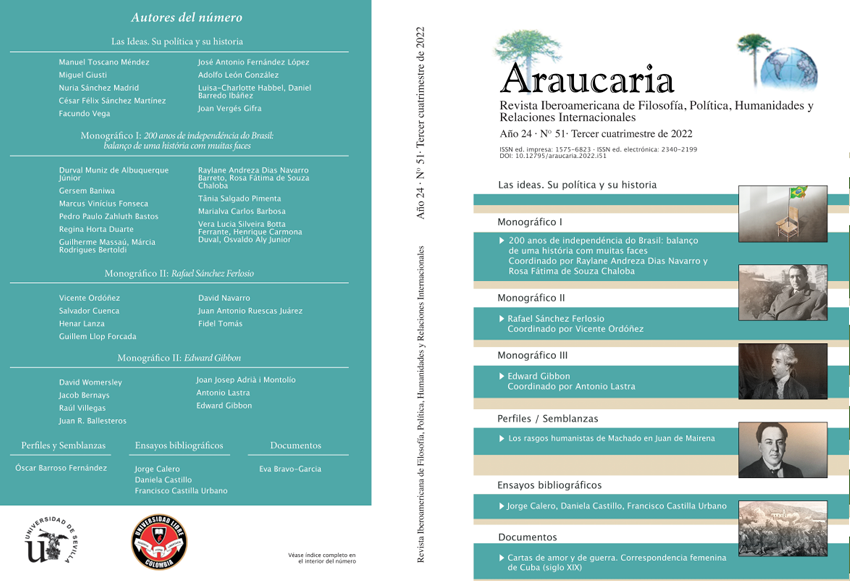No hay soberano en el Estado constitucional
DOI:
https://doi.org/10.12795/araucaria.2022.i51.01Keywords:
Constitutional State, Sovereignty, Democracy, KrieleAbstract
In this paper I will examine the relationship between constitutionalism and democracy as the alleged tensions between them appear in diagnoses about the crisis of liberal democracy. The issue is approached through the arguments of the German jurist Martin Kriele, who holds the thesis that there can be no sovereign in the constitutional State. I will begin by explaining this thesis as well as the justification offered by Kriele. According to him, the guarantee of rights and freedoms is only possible within the framework of the constitutional State. Hence, he advances a second related thesis, that democracy can only be developed in the constitutional State, that is, as constitutional democracy. However, this second thesis seems in contradiction with the first if the democratic principle implies popular sovereignty. To resolve this apparent antinomy, I will distinguish with Kriele two rival conceptions of democracy in order to point out the danger of misinterpreting the meaning of constitutional democracy.
Downloads
References
Arias Maldonado, Manuel 2020, Nostalgia del soberano. Madrid: Libros de la Catarata.
Arias Maldonado, Manuel 2021, Abecedario democrático. Madrid: Turner.
Beneyto, José María 1983, “Interpretación constitucional y legitimidad democrática en la obra de Martin Kriele” en Revista de Derecho Político, 17, pp. 153-175.
Constant, Benjamin (2020), La libertad de los antiguos frente a la de los modernos. Barcelona: 2020.
Ferrajoli, Luigi 2005, “El papel de la función judicial en el Estado de Derecho”, en Manuel Atienza y Luigi Ferrajoli, Jurisdicción y argumentación en el Estado constitucional de Derecho. México: UNAM, pp. 87- 108.
Grimm, Dieter 2015, Sovereignty. The Origin and Future of a Political and Legal Concept, New York: Columbia University Press.
Kriele, Martin 1980, Introducción a la teoría del Estado. Fundamentos históricos de la legitimidad del Estado constitucional democrático. Buenos Aires: Ediciones Depalma.
Kriele, Martin 1982a, Liberación e Ilustración. Defensa de los derechos humanos. Barcelona: Herder.
Kriele, Martin 1982b, “Libertad y dignidad de la persona humana” en Persona y Derecho, 9, pp. 39-46.
Montesquieu 2020, La separación de poderes. Barcelona: Página Indómita.
Mounk, Yascha 2018, El pueblo contra la democracia. Barcelona: Paidós.
Müller, Jan-Werner 2016, What is Populism? Philadelphia: University of Pennsylvania Press.
Olivas, José Javier 2021, “Populismo en España: fundamentos teóricos y relatos dominantes”, en Araucaria. Revista de Filosofía, Política y Humanidades, 47, pp. 371-401.
Pech, Laurent y Scheppele, Kim Lane 2017, “Illiberalism Within: Rule of Law Backsliding
in the EU” en Cambridge Yearbook of European Legal Studies, pp. 1-45.
Ragone, Sabrina 2018, “Los Länder no son ‘señores de la Constitución’: El Tribunal Constitucional Federal alemán sobre el referéndum separatista bávaro”, Teoría y Realidad Constitucional, 41, pp. 407-418.
Robles, Gregorio 2021, “Razón práctica y Derecho: la teoría del Estado y la interpretación jurídico-constitucional en Martin Kriele”, en Epistemología y Derecho. Santiago de Chile: Ediciones Olejnik, pp. 69-106.
Sartori, Giovanni 1992, “Constitución”, en Elementos de teoría política. Madrid: Alianza, pp. 13-27.
Zakaria, Fareed 1997, “The Rise of Illiberal Democracy”, Foreign Affairs, Vol. 76, nº 6 (Nov.-Dec), pp. 22-43.
Downloads
Published
How to Cite
Issue
Section
License
Las ediciones impresa y electrónica de esta Revista son editadas por el Secretariado de Publicaciones de la Universidad de Sevilla, siendo necesario citar la procedencia en cualquier reproducción parcial o total.Salvo indicación contraria, todos los contenidos de la edición electrónica se distribuyen bajo una licencia de uso y distribución “Creative Commons Atribución-NoComercial-SinDerivar 4.0 Internacional”








